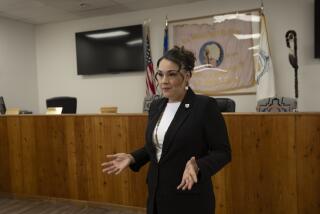Tiny Nevis Makes Big Decision
- Share via
GINGERLAND, St. Kitts and Nevis — There was no doubt how Godfrey David voted Monday morning.
“Small is beautiful,” the hotel personnel manager said as he bounded out of a polling booth in this sleepy, hillside hamlet.
And that was the sentiment of the majority on this speck of land in the eastern Caribbean, who voted that their island, Nevis, should become the newest--and smallest--nation in the Americas.
But it was not to be. The final tally reported at midnight Monday fell just short of the two-thirds majority needed for independence in a disappointing turnout of about 60% of the island’s 6,785 registered voters.
A significant minority of voters on this conservative island of 36 square miles, 47 churches, 80,000 goats and 9,000 people rejected their local leaders’ call to secede from the two-island federation of St. Kitts and Nevis, already the Western Hemisphere’s smallest country and one of the tiniest on the globe.
Driving the secession movement was a widespread sense among the 61.8% of Nevisians who voted for independence that their culture, economy and character have grown worlds apart from their 35,000 neighbors on St. Kitts, where, many here believe, a Kittsian-dominated federation government located across just two miles of narrows has shortchanged Nevis financially and morally since the two islands attained nationhood in 1983.
But there were staunch pockets of opposition to the independence move, which had to garner at least 66.6% of the ballots cast to prevail, and prominent Nevisian broadcasters predicted late Monday it will take time to heal wounds left by a vote that polarized the neighboring islands.
Speaking after the vote, federation Prime Minister Denzil Douglas acknowledged from St. Kitts: “The time has come for me to extend my hand of friendship to my brothers and sisters across the straits in Nevis.”
The “No” voters had said that Nevis isn’t ready for independence, that its $14-million annual budget is too small to support nationhood and that the island’s politicians were using the referendum simply to build their own power base.
Campaigning under a banner of “If not now? When?” Nevis’ elected premier, Vance Amory, had called Monday’s vote “a golden opportunity” for self-determination that carried a message for the world as a whole.
“Whereas many countries throughout the world have fought fierce battles and wars for their independence, we can attain ours constitutionally, democratically and peacefully by voting ‘Yes,’ ” he told his fellow Nevisians on the eve of balloting he later called a “disappointment.”
“The people of Nevis want to be in control of their affairs. That is the issue at hand. There is no other issue.”
There was, however, a precedent.
Originally, the federation that British colonialists created here included a third island--a sandbar called Anguilla, which separated from the semiautonomous federation in 1967 and declared its renewed dependence on Britain. When Britain gave the two remaining islands full independence in 1983, their constitution gave Nevis the right to secede, which most of the electorate here appeared to embrace throughout a tranquil voting day.
Several Nevisians interviewed after they drew their simple Xs through boxes labeled either “Yes” or “No” said they had opted for the latter.
“I went and made my X for No,”’ said Loretta Tyson, 43. “I lived 10 years in the States and gave up everything to come back here to live. If things go bad, I’m afraid I’ll have to run back there again. Besides, we Nevisians have too many families in St. Kitts. We’re too close for this.”
The ties between Nevisians and Kittsians are, in fact, so deep that most have relatives scattered between the two islands. And as of Monday, elected officials here and in St. Kitts had yet to negotiate how to resolve such sticky issues as separate passports, citizenship, tariffs and territorial boundaries.
“Far too many issues have not been addressed,” Clifford E. Griffin, a Nevis-born political science professor at North Carolina State University, wrote in a lengthy study on the secession issue.
For the majority of Nevisians interviewed Monday, though, such issues were secondary to those of image, law and order, self-determination and identity.
Many cited a long history of neglect by authorities in St. Kitts, where a network of paved streets, highways and a modern international airport contrasts with Nevis’ pitted two-lane roads and an airport that consists of a single landing strip and a two-room shack.
The single biggest issue ahead of Monday’s vote, though, was self-determination and a newly empowered sense of national pride, according to Kenneth Williams, editor and publisher of Nevis’ pro-independence weekly newspaper, the Observer.
Williams and others said they had no doubt that an independent Nevis and its top-end tourist resorts and thriving offshore industry could survive economically.
But even the most ardent secessionists conceded the obvious: An independent Nevis would still have ranked along with the Pacific island states of Nauru and Tuvalu as the world’s smallest.
Llewellyn “Sunshine” Caines, the St. Kitts-born Rastafarian proprietor of Nevis’ popular Sunshine’s Beach Bar and Grill, was typical of the fence-sitting voters analysts said tipped the balance against secession.
“Some people are going to live nice in an independent Nevis,” Caines said. “The politicians are going to live great. But I think about the people--in the long term. Whatever goes down, I’ll work with it. But I think about what’s best for the people.”
More to Read
Sign up for Essential California
The most important California stories and recommendations in your inbox every morning.
You may occasionally receive promotional content from the Los Angeles Times.











